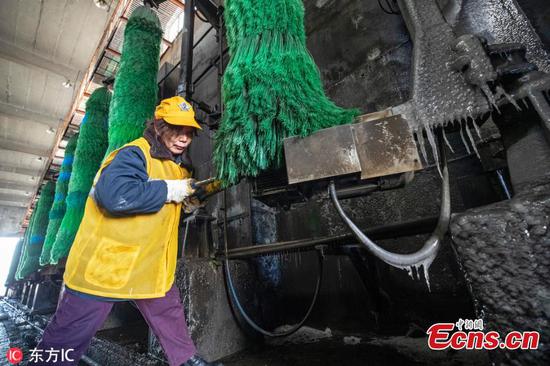
Children learn English at a community center in the Yayuncun area of Beijing. (JU HUANZONG/XINHUA)
VIPKid, a domestic online education platform that employs 60,000 North American English teachers to give one-on-one lessons, said the number of its students younger than 6 has been rising since 2013-when the startup was founded-and has reached 70,000 nationwide.
According to the platform, "Most students are from big cities, such as Beijing, Shanghai and Shenzhen (Guangdong province), while those from Hangzhou (Zhejiang province), Chengdu (Sichuan province) and a number of smaller cities has risen by leaps and bounds."
EF Education First China, which claims to be the first to offer English training for children ages 3 to 6 on the Chinese mainland more than 10 years ago, said it has over 150 branches in second- and third-tier cities, and has achieved double-digit growth annually in recent years.
Bai said, "We upgraded our classes for 3- to 6-year-olds nationwide in December, enabling confidence-building, personality formation and development of social skills in an immersive language environment, in response to parents' expectations of their children's all-around development."
Zhou said her aim in getting her daughter to learn English at such a young age is that she hopes that when she wants to express herself to people from anywhere in the world in the future, language will not be a barrier.
Zhou, whose English skills are outstanding and who started to learn the language in the third grade in primary school, said she was motivated by peer pressure.
"A year ago, when I took my daughter to a dinner with friends and their kids ages 2 to 4, they were all talking in English with their children," said Zhou, an editor at a foreign media outlet.
Another observation is that when the real economy subsided, a host of stores were replaced by educational institutes for children, many of them offering English classes, Zhou said.
Some school teachers have switched to such institutions.
Li Lin, who taught English at a bilingual primary school in Shanghai for five years, is one of them. In July, she started to teach at an institution specializing in helping children ages 4 to 15 form reading habits and improving their reading ability.
She said she was mainly prompted to change jobs because what she taught in class was strictly controlled. "I felt we were preparing the kids for exams rather than helping them to widen their ability.
"I believe such institutions are a necessary addition to school education, as children in most schools, especially public ones, only read textbooks, which makes it hard for them to form the habit of reading other books," she said.
Some parents are not seeking definite returns on their educational investment. For them, sending children to learn a language is better than letting them sit in front of the TV.
Lin Peiqian, a mother in Shanghai, said: "My husband and I arrive home after work no earlier than 7 pm. There are three hours when my 4-year-old son and 2-year-old daughter can only stay with grandparents or the nanny. So I'd rather send them to learn something."
Lin said she and her husband spend about 40,000 yuan ($5,836) a year for both children to attend English classes.


















































